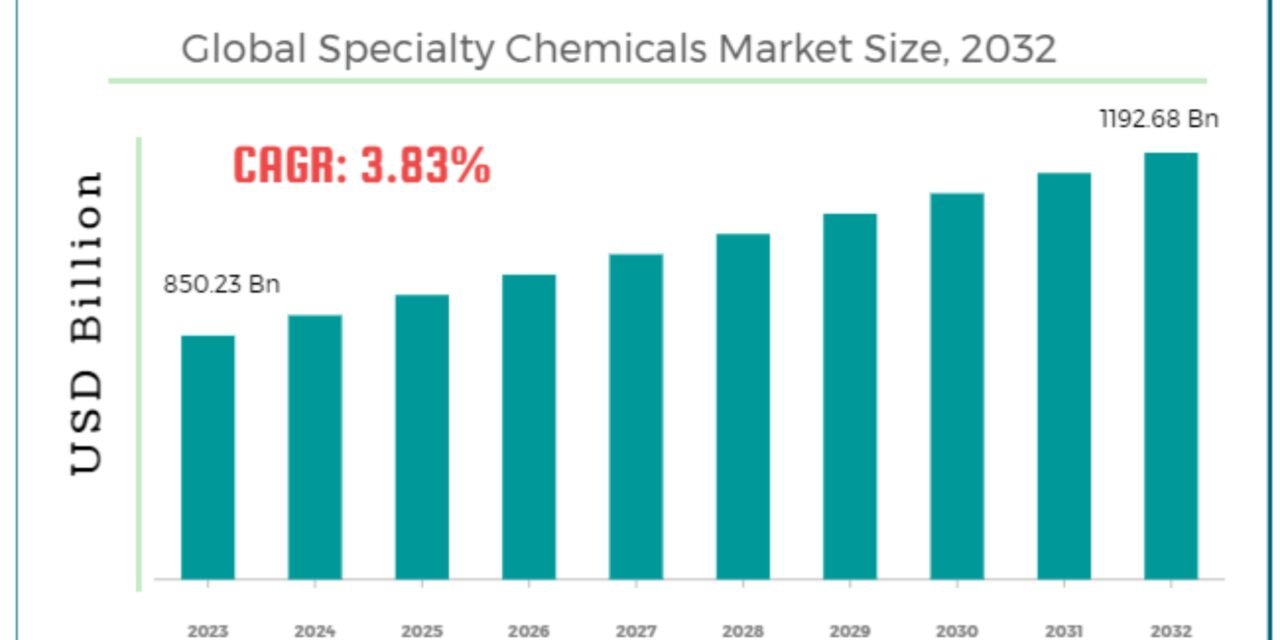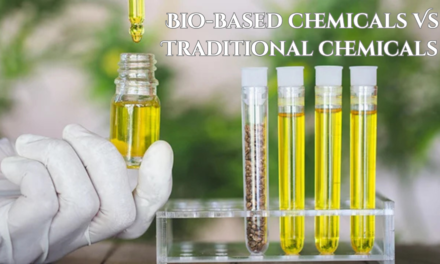The specialty chemicals market generally offers higher growth potential compared to the broader chemicals market due to several factors, including its focus on niche products, advanced technologies, and growing demand for specialized solutions across various industries. Here’s a detailed comparison of the two markets in terms of growth potential:
1. Market Size and Scope
- Broad Chemicals Market: The broader chemicals market encompasses a wide range of commodity chemicals, including bulk chemicals, petrochemicals, and basic industrial chemicals. This market is highly mature and includes products such as acids, alkalis, solvents, fertilizers, and plastics. Growth in this segment tends to be slower, driven by factors like global population growth, infrastructure development, and industrial demand.
- Specialty Chemicals Market: Specialty chemicals, on the other hand, are more focused on high-value, niche products used in specific applications across diverse industries like electronics, pharmaceuticals, automotive, cosmetics, agriculture, and food & beverages. This market is characterized by products that offer unique characteristics and high margins, such as functional coatings, additives, biocides, and advanced materials.
2. Growth Drivers
- Broad Chemicals Market:
- Stable Demand: The growth in the broader chemicals market is generally driven by stable demand in sectors like manufacturing, agriculture, and construction. While these sectors are essential, they often experience slower growth due to market saturation and established production capacities.
- Commodity Prices: Prices in the broad chemicals market are often more volatile due to fluctuations in raw material costs (e.g., crude oil, natural gas) and demand-supply imbalances, impacting the growth rate.
- Environmental Regulations: Increased regulation, particularly on emissions and waste management, may limit the growth of some traditional chemicals, pushing the industry to adapt with new technologies and cleaner alternatives.
- Specialty Chemicals Market:
- Innovation and Customization: The specialty chemicals market benefits from constant innovation, with companies developing customized solutions tailored to the needs of specific industries. For example, the increasing demand for biodegradable plastics, eco-friendly cleaning agents, functional coatings, and bio-based chemicals is driving growth.
- Technological Advancements: Rapid advancements in nanotechnology, biotechnology, and advanced materials are opening new growth avenues. Electronics, battery manufacturing, and medical devices rely heavily on specialty chemicals to enhance the functionality and performance of their products.
- Sustainability and Green Chemistry: Increasing demand for sustainable and eco-friendly solutions in sectors like agriculture, packaging, and automotive is pushing the growth of green specialty chemicals, which are designed to minimize environmental impact and improve product performance.
- Consumer Trends: The growing interest in health and wellness, cosmetic formulations, and personal care products is boosting demand for specialty chemicals, especially in cosmetics, fragrances, and skin-care products.
3. Profit Margins
- Broad Chemicals Market: Commodity chemicals typically have lower profit margins due to the high volume of production and competition. Prices are often dictated by market supply and demand, with manufacturers competing on cost efficiency and scale.
- Specialty Chemicals Market: Specialty chemicals enjoy higher profit margins as they are often tailored to specific customer needs and offer differentiated value. The high-value nature of these chemicals—combined with their unique properties, limited competition, and specialized applications—allows manufacturers to command premium prices.
4. Market Volatility
- Broad Chemicals Market: The broader chemicals market can be subject to greater volatility due to factors such as fluctuations in raw material prices (e.g., crude oil), geopolitical tensions, and macroeconomic conditions. For example, the chemical industry can be impacted by global supply chain disruptions or fluctuations in energy prices.
- Specialty Chemicals Market: The specialty chemicals market tends to be more resilient to market volatility. Since many specialty chemicals serve essential, niche applications (such as electronics or pharmaceuticals), demand is less likely to fluctuate dramatically, even during economic downturns. This makes the specialty chemicals market more stable over time.
5. Industry-Specific Demand
- Broad Chemicals Market: Demand in the broader chemicals market is often tied to traditional industries like construction, agriculture, textiles, and automotive manufacturing. These sectors are crucial, but their growth rates can be relatively steady or slow, depending on the state of the global economy.
- Specialty Chemicals Market: The specialty chemicals market benefits from diverse end-user industries that continue to expand and evolve. For example:
- Electronics and Technology: Specialty chemicals are integral to the production of semiconductors, displays, and other advanced technologies.
- Pharmaceuticals: Specialty chemicals are used in drug development, formulation, and packaging, driving significant demand in the healthcare sector.
- Automotive and Aerospace: The demand for lightweight, high-performance materials in electric vehicles (EVs), batteries, and aerospace applications continues to drive growth in the specialty chemicals market.
- Agriculture: Specialty fertilizers, biopesticides, and growth regulators are increasingly in demand as sustainable farming practices rise.
6. Regulatory Influence
- Broad Chemicals Market: Regulatory standards in the broader chemicals market—especially in areas like toxic substances, pollution control, and waste management—can limit the growth of certain traditional chemicals. However, these regulations can also encourage innovation in cleaner, more sustainable production processes.
- Specialty Chemicals Market: Specialty chemicals are often subject to regulations tailored to their specific applications (e.g., pharmaceutical regulations, food safety standards, automotive compliance). These regulations can sometimes act as barriers to entry, but they also drive demand for specialized products that meet specific regulatory standards, increasing their value and demand.
7. Geographic Growth Opportunities
- Broad Chemicals Market: The broader chemicals market experiences strong demand growth in emerging markets, driven by urbanization, industrialization, and infrastructure development. However, these markets often face challenges related to environmental regulations and sustainability goals.
- Specialty Chemicals Market: The specialty chemicals market also benefits from growing demand in emerging markets, particularly for higher-value products that improve the quality and functionality of goods in sectors like electronics, automotive, and consumer goods. Additionally, the demand for specialty chemicals in developed markets remains strong due to their use in advanced technologies and sustainable applications.
8. Maturity and Market Saturation
- Broad Chemicals Market: Many areas of the broad chemicals market are mature with established competitors. While demand continues, growth tends to be more stable and incremental, making the market less dynamic in terms of growth potential.
- Specialty Chemicals Market: The specialty chemicals market is generally in a growth phase, with expanding applications, new technologies, and increasing demand for innovative solutions. As industries like biotechnology, electronics, and green energy continue to grow, the specialty chemicals market benefits from new product development and increased opportunities for innovation.
Conclusion
The specialty chemicals market generally has higher growth potential compared to the broader chemicals market due to its focus on high-value, niche products, technological innovation, and the growing demand for specialized solutions across various industries. While the broader chemicals market remains an essential part of the global economy, it is often characterized by slower growth and lower profit margins. The specialty chemicals sector, on the other hand, is driven by innovation, sustainability trends, and the need for tailored solutions, making it more dynamic and potentially more profitable in the long term.
Hahstags
#SpecialtyChemicalsGrowth #ChemicalsMarketGrowth #MarketExpansion #ChemicalsIndustryGrowth #SpecialtyVsBulkChemicals #HighGrowthChemicals #NicheChemicals #AdvancedChemicals #ChemicalsMarketTrends #SpecialtyChemicalsFuture #EmergingChemicalsMarket #GrowthPotential #ChemicalsInnovation #FutureOfChemicals #SpecialtyChemicalsInnovation #ChemicalsForTomorrow #ChemicalMarketDynamics #GrowthInChemicals #ExpandingSpecialtyChemicals #ChemicalsMarketOutlook










